This article was co-authored by Pouya Shafipour, MD, MS and by wikiHow staff writer, Megaera Lorenz, PhD. Dr. Pouya Shafipour is a Family Medicine Specialist, Primary Care Physician, and a Weight Loss Specialist based in Santa Monica, California. Dr. Shafipour specializes in dietary, nutritional, behavioral, and exercise counseling to manage obesity and medical conditions related to excessive weight gain or loss. Dr. Shafipour received a BS in Molecular and Cell Biology from the University of California, Berkeley, an MS in Physiology and Biophysics from Georgetown University, and an MD from the Loma Linda University School of Medicine. He completed his internship in general surgery at UC Irvine and a residency in family medicine at the University of California, Los Angeles, and became board certified in family medicine in 2008.
There are 12 references cited in this article, which can be found at the bottom of the page.
This article has been viewed 44,835 times.
If you are in the situation of caring for an obese family member, you may be concerned about their health. If your relative has limited mobility or other health issues related to their weight, you can provide practical help with daily activities and medical treatment. If your relative is interested in losing weight, be supportive and encouraging—having an advocate and cheerleader can make all the difference for someone going through this difficult process. Let your loved one know that you are there for them and love them unconditionally.
Steps
Helping a Relative with Obesity-Related Health Problems
-
1Help your relative get to medical appointments, if necessary. Receiving regular checkups and medical care is important for people with weight-related conditions. Ask your relative if they need help setting up or getting to medical appointments. They may also want to have someone come along to appointments as an advocate or to provide company and emotional support.
- If your loved one has mobility limitations or does not have easy access to transportation, offer to drive them to appointments (if you can) or help them make other transportation arrangements.
-
2Check in with your relative to make sure they are okay. If your relative has health or mobility problems and they don’t live with a caregiver, drop by or give them a call from time to time to find out how they are doing. Ask them how they are feeling and if there is anything you can do to help.
- For example, you might ask, “Do you need me to swing by the pharmacy and pick up a refill of your blood pressure medication?” or “How are you feeling? Is that pain in your knees any better?”
Advertisement -
3Assist them with daily life activities, if necessary. Obesity can cause mobility limitations, especially in people who are extremely obese or have obesity-related health issues, such as type 2 diabetes.[1] Depending on how severe your loved one’s health problems are, they may need help with day-to-day activities like:
- Getting groceries and other necessities.
- Doing chores around the house and yard.
- Basic self-care, such as bathing or getting dressed.
-
4Provide support during stressful medical procedures. Most medical treatments for obesity focus on non-invasive approaches, such as diet and lifestyle changes.[2] However, people who are severely obese or have major health complications may need more extreme interventions and treatments, such as weight-loss surgery or joint replacement surgery. Help your relative by offering emotional and practical support before, during, and after these types of difficult procedures.
- For example, if your relative has to have their hip replaced, you might offer to stay with them for a while after their surgery and help out around the house.
- You can also attend pre- and post-operative medical appointments so that you know how to care for your relative during their recovery and deal with any potential complications.
-
5Be an advocate for them, if necessary. Unfortunately, healthcare providers are not always immune from common prejudices and negative attitudes toward obese people. This means that people struggling with obesity sometimes receive lower quality healthcare than people who are not obese.[3] As a healthcare advocate, you can help your relative by:[4]
- Going to medical appointments with them and taking notes.
- Assertively expressing concerns or asking questions about their healthcare during appointments or hospital stays. For example, “Could you please explain what this medication is for, and what the risks and side effects might be?”
- Getting familiar with your relative’s symptoms, health history, and any past or current medications or treatments they have received.
Encouraging Your Relative to Manage Their Weight
-
1Avoid pressuring your relative to make a change. Your relative already knows they are obese. Telling them they are obese and badgering them to lose weight won’t help motivate them—these things are more likely to just make them feel worse about themselves and their situation. Let them know that you are there for them and want to support them, but hold off on giving advice or trying to pressure them into making any major lifestyle changes.
- For example, you might say something like, “I really care about you, and I know you’ve been dealing with some stress and health issues lately. Just know I’m always here for you if you need help.”
- Avoid shaming and blaming or offering simplistic advice, such as “You just need to stop eating so much junk food!”
-
2Model healthy behaviors. Even if your relative is not ready to make major changes or reach out for help, you can help by setting a good example. Eat healthy foods, and avoid tempting or discouraging your loved one by chowing down on junk food and sugary desserts in their presence. Get regular physical activity, even if it’s just a walk around the block every day, and invite your relative to join you [5]
- For example, you might say, “Hey, I need to walk the dog, and it’s really nice out. Want to go with me?”
-
3Ask them what you can do to help. If your relative reaches out to you about wanting to lose weight or make a lifestyle change, find out what kind of support they are looking for. They may just want someone to vent to, or they might want an exercise buddy. Before you jump in with suggestions, ask a few open-ended questions, such as “Is there anything I can do to help out?” or “What are some ways I can make things easier for you?”[6]
- If you think your relative is dropping indirect hints, ask questions to find out if they’re interested in help. For example, if they say, “I really need to get in shape,” you might say something like, “Would you maybe be interested in working out with me?”
-
4Encourage them to get advice from a doctor or dietitian. Some approaches to weight loss are healthier and more effective than others. If your relative says they want to start getting healthier or losing weight, encourage them to seek medical advice. A doctor or registered dietitian can assess their overall health and help them make healthy lifestyle choices that work for them.[7]
-
5Be their accountability buddy. It’s challenging to make major lifestyle changes, especially if you’re trying to do it on your own. Your relative will have an easier time making changes and staying healthy if they have someone sharing the journey with them. Instead of standing back and lecturing them or trying to be a “coach” (e.g., “Hey, why are you eating that? You’re supposed to be on a diet!”), set goals together and encourage each other as teammates.
- For example, you might say, “I know we both have a habit of snacking late at night. How about we check in with each other every evening after dinner and remind each other not to eat any junk food right before bedtime?”
-
6Focus on health, rather than weight loss. Although losing weight can be an important goal for someone struggling with obesity, the primary focus should be on making lifestyle changes that improve your loved one’s overall health.[8] Being slim is not as important as being healthy. Instead of talking about goals purely in terms of weight loss, focus on helping them make positive changes.[9]
- For example, instead of helping your relative set a goal of losing a certain amount of weight in a certain time, encourage them to set a specific fitness goal (e.g., “Let’s plan to walk for at least 30 minutes a day, 5 days a week.”).
-
7Celebrate the journey instead of the outcome. Losing weight and getting (and staying) healthy are lifelong processes for most people. Instead of focusing on how much weight your relative has lost, praise the hard work they are putting in and celebrate other positive changes you are seeing in their life.[10]
- For example, instead of saying, “Wow, Aunt Susan, you look fantastic after losing all that weight!” say something like, “I’m so proud of you for sticking to your diet and exercise program like this. I know it’s not easy.”
-
8Let them know that setbacks are okay. Your relative may feel frustrated or discouraged if they have been making steady progress, only to find that they are putting the pounds back on again or struggling to maintain their lifestyle changes.[11] Remind them that this is a totally normal and inevitable part of the weight loss process. You can also help by:
- Working with them to determine what caused the setback, and helping them avoid a repetition. For example, maybe they tend to overeat when you go out to a particular restaurant together. If so, avoid going back for a while.
- Helping them keep it in perspective. Remind them of everything they’ve accomplished so far, and point out the progress they’ve made overall instead of focusing on the individual ups and downs along the way.
Being Emotionally Supportive
-
1Let your relative know that you love them unconditionally. It’s normal to feel anxious or frustrated when you see a loved one dealing with obesity. Keep in mind that their weight is just a small part of who they are as a person, however. Tell them you support them and care about them, and focus on the positive.
- For example, you might say, “I believe in you, Phil. You’re the best brother ever, and one of the kindest and strongest people I know. If you ever need help, I’m here.”
-
2Listen actively when they need to talk. If you want to support your relative, help them feel that they can talk to you without fear of being judged.[12] If they feel like venting or opening up to you, let them do most of the talking. Validate their feelings, and let them know that you are making an effort to hear and understand what they have to say.
- Say things that let them know you are listening and empathizing, like “I hear ya,” or “That must be so tough.”
- Try rephrasing some of the things they say, so that it’s clear you are making an effort to understand. For example, “It sounds like you have a really hard time staying active because your job keeps you behind a desk so much.”
-
3Encourage them to do things they enjoy. The emotional and physical stresses of dealing with obesity can cause sufferers to isolate themselves and withdraw from activities they used to enjoy. Help your loved one find joy and meaning in life by inviting them to participate in activities you know they will find fun and uplifting.
- For example, you might say, “Hey, Mom, I know how much you love gardening. Why don’t we check out the new plant nursery that just opened up downtown? Maybe we can pick out a couple rose bushes for the front yard and plant them together.”
-
4Acknowledge that obesity is not always easy to treat. For many people, overcoming obesity is not as simple as cutting back on junk food and hitting the gym. Consider all the factors that may be contributing to your relative’s obesity, and be objective and empathetic.
- For example, your relative may have an underlying health condition that makes it hard for them to stay active, or they might be on a medication that makes them gain weight. Never assume that someone is obese because they are “lazy” or “not trying hard enough.”
Understanding Obesity
-
1Read up on the possible complications of obesity. Obesity is defined as having a body mass index (BMI) of 30 or higher. Being obese doesn’t always mean someone is unhealthy.[13] However, obesity is often linked to a variety of health problems, including:[14]
- High triglycerides and low HDL (“good cholesterol”)
- High blood pressure
- Type 2 diabetes
- Stroke
- Heart disease
- Certain types of cancer
- Breathing problems, especially sleep apnea
- Gallbladder disease
- Problems with sexual and reproductive health
- Liver disease
- Osteoarthritis
-
2Research the underlying causes of your loved one’s obesity. Most commonly, obesity is caused by unhealthy eating habits combined with inactivity. In many cases, however, there are other factors at play. Some people gain weight more easily than others due to genetics and hormonal factors. Additionally, obesity may be the result of unhealthy habits that are linked to psychological conditions, such as depression. Taking into account your loved one's pediatric history is important in understanding the causes of their obesity.[15] Other risk factors include:[16]
- Certain medical conditions, such as Prader-Willi syndrome and Cushing’s syndrome.
- Some types of medications, such as antidepressants, anti-seizure medications, beta blockers, steroids, diabetes medications, and antipsychotic medications.
- Conditions that limit mobility, such as severe arthritis.
-
3Ask a healthcare provider about possible medical treatments. The right treatment for obesity depends on many factors, including your relative’s overall health, the severity of their obesity, and any underlying conditions. Talk to your loved one’s primary care doctor or a dietitian about what treatments are available, and what might be best for your relative. Treatment approaches for obesity include:[17]
- Diet and exercise.
- Behavioral therapy.
- Prescription weight loss medications.
- Surgical options, such as gastric bypass surgery.
- Treatments for underlying conditions, such as depression, eating disorders, or metabolic disorders.[18]
- In some cases, support groups or counseling can be helpful.
Help Showing Support
Expert Q&A
Did you know you can get expert answers for this article?
Unlock expert answers by supporting wikiHow
-
QuestionWhat are some misconceptions about losing weight in a healthy way?
 Pouya Shafipour, MD, MSDr. Pouya Shafipour is a Family Medicine Specialist, Primary Care Physician, and a Weight Loss Specialist based in Santa Monica, California. Dr. Shafipour specializes in dietary, nutritional, behavioral, and exercise counseling to manage obesity and medical conditions related to excessive weight gain or loss. Dr. Shafipour received a BS in Molecular and Cell Biology from the University of California, Berkeley, an MS in Physiology and Biophysics from Georgetown University, and an MD from the Loma Linda University School of Medicine. He completed his internship in general surgery at UC Irvine and a residency in family medicine at the University of California, Los Angeles, and became board certified in family medicine in 2008.
Pouya Shafipour, MD, MSDr. Pouya Shafipour is a Family Medicine Specialist, Primary Care Physician, and a Weight Loss Specialist based in Santa Monica, California. Dr. Shafipour specializes in dietary, nutritional, behavioral, and exercise counseling to manage obesity and medical conditions related to excessive weight gain or loss. Dr. Shafipour received a BS in Molecular and Cell Biology from the University of California, Berkeley, an MS in Physiology and Biophysics from Georgetown University, and an MD from the Loma Linda University School of Medicine. He completed his internship in general surgery at UC Irvine and a residency in family medicine at the University of California, Los Angeles, and became board certified in family medicine in 2008.
Board Certified Family Medicine Specialist
Warnings
- Some people have health conditions that limit their diet or exercise abilities. Adhering to an extreme exercise plan, especially when first starting out, is not recommended for long-term weight loss success.[19] Never push your loved one to do something unhealthy or unsafe for their individual body.⧼thumbs_response⧽
References
- ↑ https://www.ncbi.nlm.nih.gov/pmc/articles/PMC3339039/
- ↑ https://www.mayoclinic.org/diseases-conditions/obesity/diagnosis-treatment/drc-20375749
- ↑ https://www.ncbi.nlm.nih.gov/pmc/articles/PMC4381543/
- ↑ https://www.hopkinsmedicine.org/health/healthy_aging/caregiver_resources/the-power-of-a-health-care-advocate
- ↑ https://www.cnn.com/2016/08/24/health/how-to-talk-about-weight-loss-health/index.html
- ↑ https://www.cnn.com/2016/08/24/health/how-to-talk-about-weight-loss-health/index.html
- ↑ https://www.mayoclinic.org/diseases-conditions/obesity/diagnosis-treatment/drc-20375749
- ↑ https://www.webmd.com/diet/obesity/features/lose-weight-dangers
- ↑ https://www.cnn.com/2016/08/24/health/how-to-talk-about-weight-loss-health/index.html
- ↑ https://www.prevention.com/weight-loss/weight-loss-tips/how-support-someones-weight-loss-efforts
- ↑ https://www.ncbi.nlm.nih.gov/pmc/articles/PMC6917653/
- ↑ https://www.verywellmind.com/what-is-active-listening-3024343
- ↑ https://www.health.harvard.edu/blog/overweight-and-healthy-the-concept-of-metabolically-healthy-obesity-201309246697
- ↑ https://www.mayoclinic.org/diseases-conditions/obesity/symptoms-causes/syc-20375742
- ↑ Pouya Shafipour, MD, MS. Board Certified Family Medicine Specialist. Expert Interview. 8 May 2020.
- ↑ https://www.mayoclinic.org/diseases-conditions/obesity/symptoms-causes/syc-20375742
- ↑ https://www.mayoclinic.org/diseases-conditions/obesity/diagnosis-treatment/drc-20375749
- ↑ Pouya Shafipour, MD, MS. Board Certified Family Medicine Specialist. Expert Interview. 8 May 2020.
- ↑ Pouya Shafipour, MD, MS. Board Certified Family Medicine Specialist. Expert Interview. 8 May 2020.


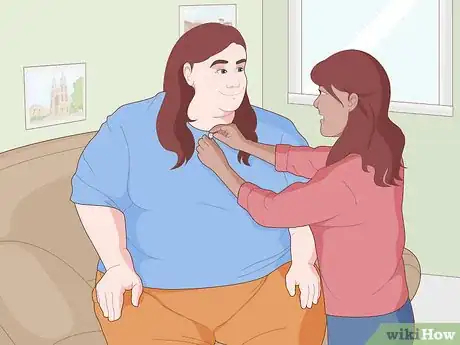
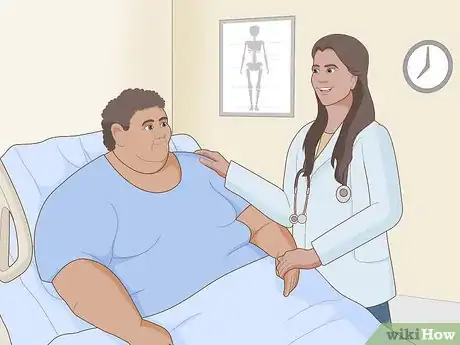

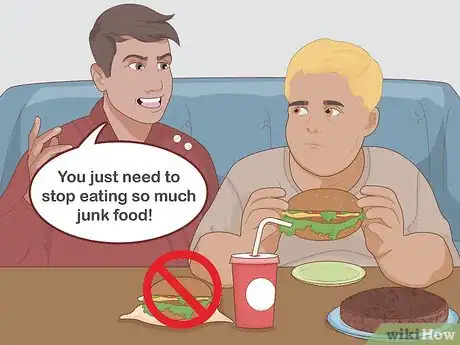




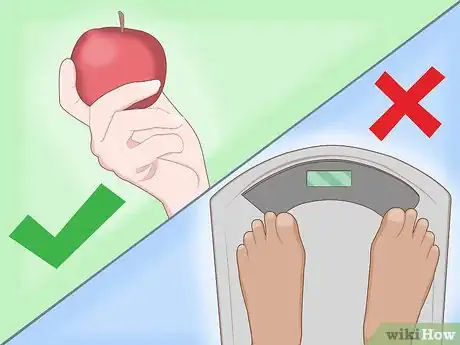

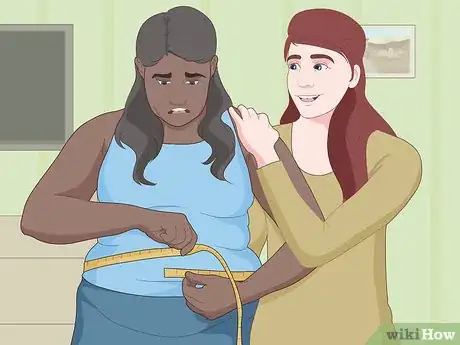



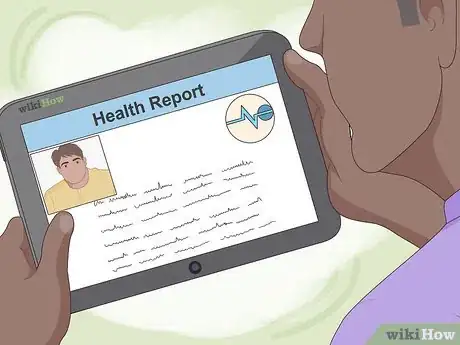
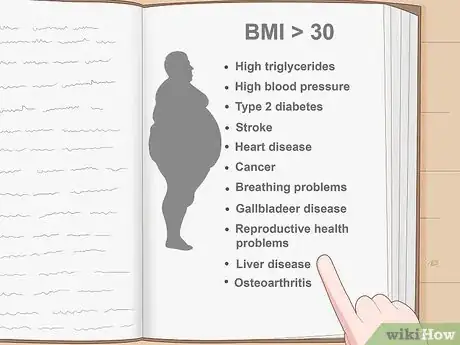


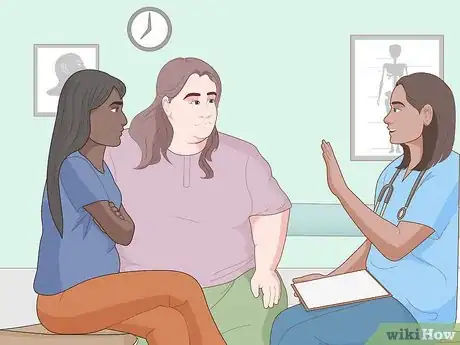



-Step-13.webp)










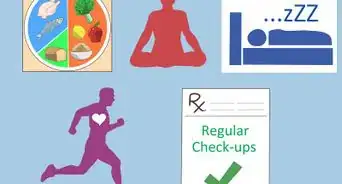








-Step-13.webp)




































Medical Disclaimer
The content of this article is not intended to be a substitute for professional medical advice, examination, diagnosis, or treatment. You should always contact your doctor or other qualified healthcare professional before starting, changing, or stopping any kind of health treatment.
Read More...